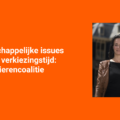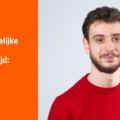
How do you use the social ideas power of your organization?
Want to talk to colleagues about an inclusive workplace? A meat-free future? Or combating institutional racism? A safe space in which you can openly discuss social issues is crucial to arrive at impactful ideas together. Fortunately, the Issuemakers lunch table is such a place for me. But many organizations are reluctant to talk about socially sensitive topics. Before you know it, colleagues will label you as 'right-wing' or 'woke-crazy.' How can you prevent such a polarized debate from being at the expense of the power of ideas within your organization?
A different view on anonymity
In my search for an answer to this question I was triggered by one interview with Australian philosopher Peter Singer. This summer, the influential thinker talked in De Volkskrant about his scientific journal in which scientists are allowed to publish under a pseudonym. Singer and his colleagues came up with the idea Journal of Controversial Ideas after a fellow philosopher received death threats following a piece on euthanasia of newborns. “Scientists who write about controversial topics are berated and threatened,” Singer notes. By offering anonymity, the philosopher wants ideas to be judged on their own merits.
The Journal of Controversial Ideas has shifted my view on anonymity. I mainly viewed anonymity from an egoistic view of humanity. This view of humanity is aptly described in Plato's story 'The Ring of Gyges.' In this story Glaucon tells the myth about the shepherd Gyges. After an earthquake, the shepherd stumbles upon a golden ring that can make him invisible. Gyges uses the ring to get rid of the king, seduce his wife and take the throne himself. Moral of the story: the anonymity of the ring protects you from the consequences of an evil act, and ensures uncivilized and selfish behavior in everyone. Look at Twitter and you will see that this message is still relevant: online anonymity is a modern Gyges ring and creates a flow of hate messages.
But anonymity and public debate do not always have to have a toxic relationship, I now know The Journal of Controversial Ideas. Use anonymity correctly and it provides space for well-argued ideas that advance the public debate on sensitive topics.
Anonymity in your organization
Can anonymity also be used to generate good ideas in your organization? Yes, for example, think of the old-fashioned suggestion box that used to hang in an office hall. However, more proactive and targeted ways are conceivable. One of them is the Issue Sprint who develops Issuemakers for organizations. In fixed steps, based on Google's Design sprint, from problem to solutions to a social issue. Together we analyze the problem, discover opportunities and come up with feasible solutions. Important element when setting up the Issue Sprint? You guessed it: anonymity.
We use the various experts and insights within an organization. To achieve this, we try to gain all insights from the organization. This means that every participant, whether it is the director or the desk clerk, must be able to express his or her ideas. Ideas must be able to be assessed on their own, regardless of the sender, and therefore anonymously. In the safe pressure cooker of creative social insights that we create, participants often want to voluntarily explain their insights personally (but it is not necessary!). This means that we all too often come up with concrete, creative, supported and unexpected solutions for social issues – and in a very short time. Experience shows that by bringing together different expertise from organizations in this way, you can take steps within half a day that would normally take weeks or months.
Would you like to know more about how you can use the idea power of your organization through an Issue Sprint? View the offer on our website or contact one of our advisors.





